Unit3 How do you get to school 课件(139张PPT)
文档属性
| 名称 | Unit3 How do you get to school 课件(139张PPT) |
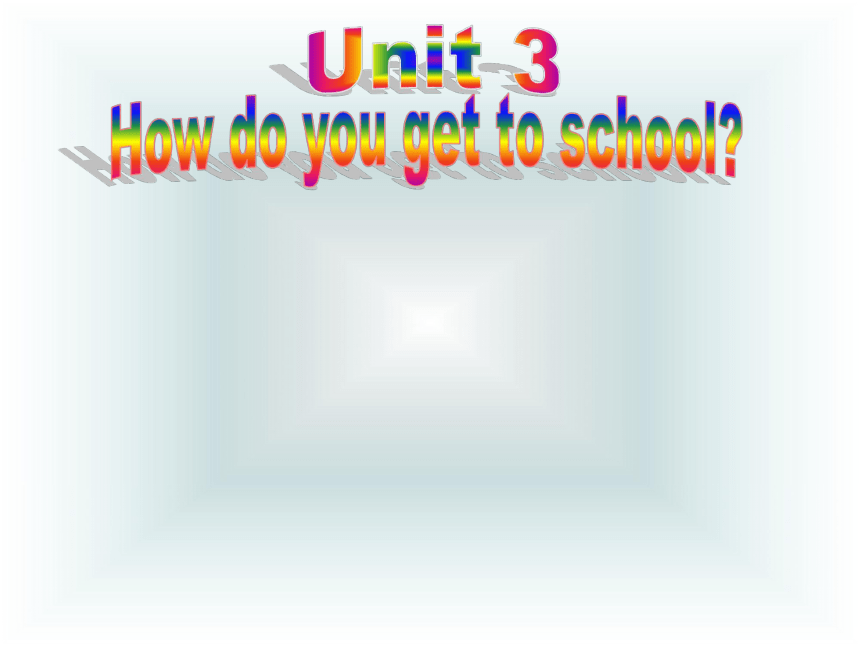
|
|
| 格式 | ppt | ||
| 文件大小 | 4.6MB | ||
| 资源类型 | 教案 | ||
| 版本资源 | 人教新目标(Go for it)版 | ||
| 科目 | 英语 | ||
| 更新时间 | 2022-03-23 00:00:00 | ||
图片预览


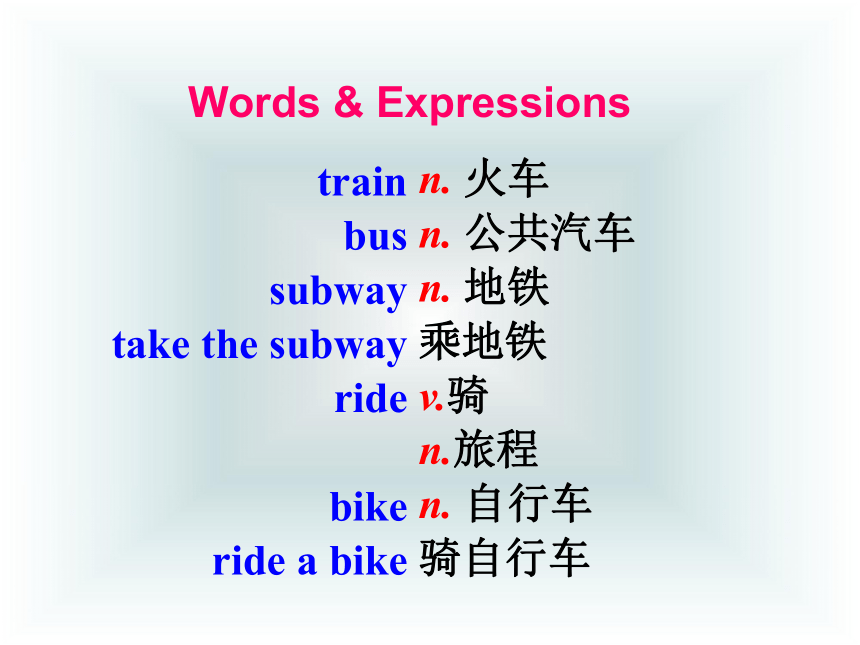
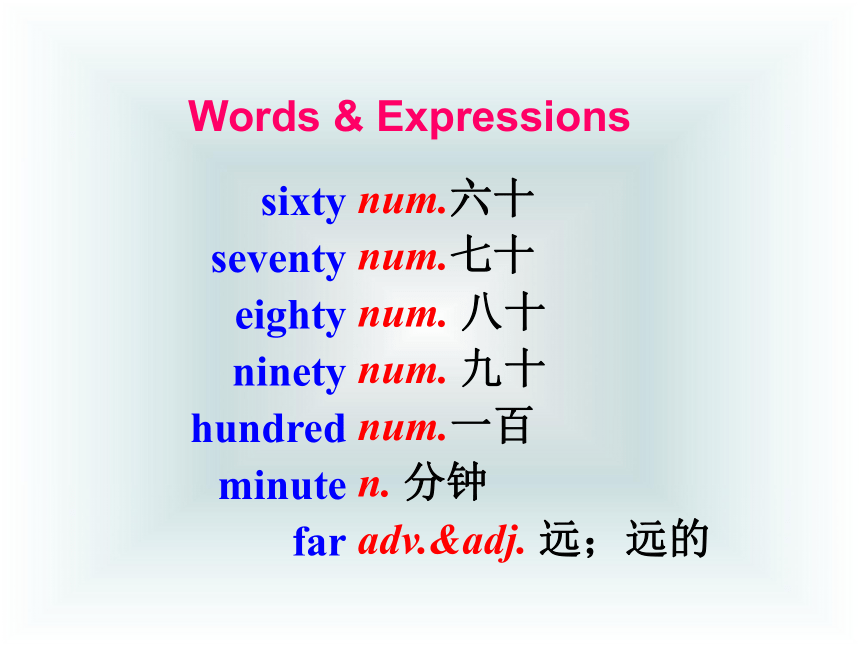
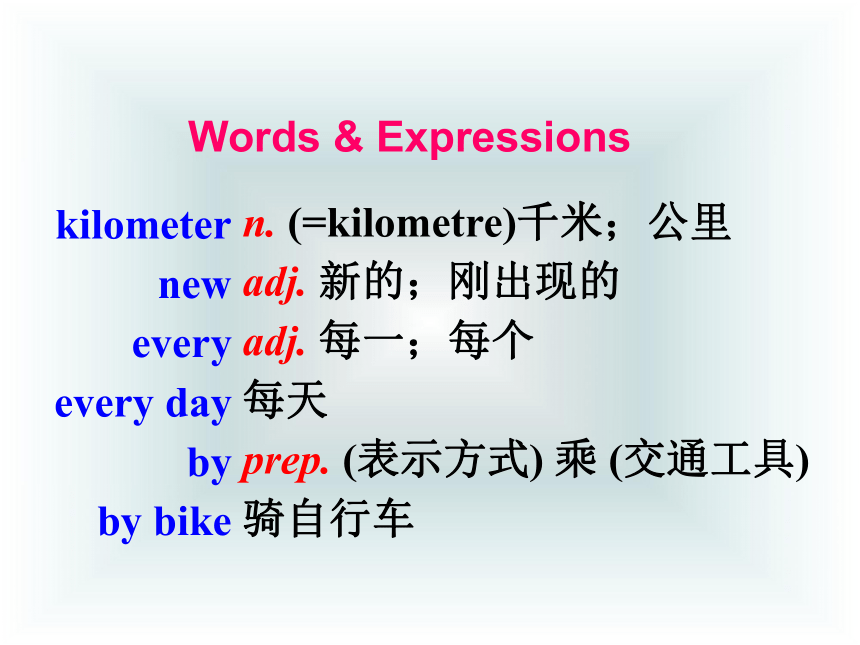
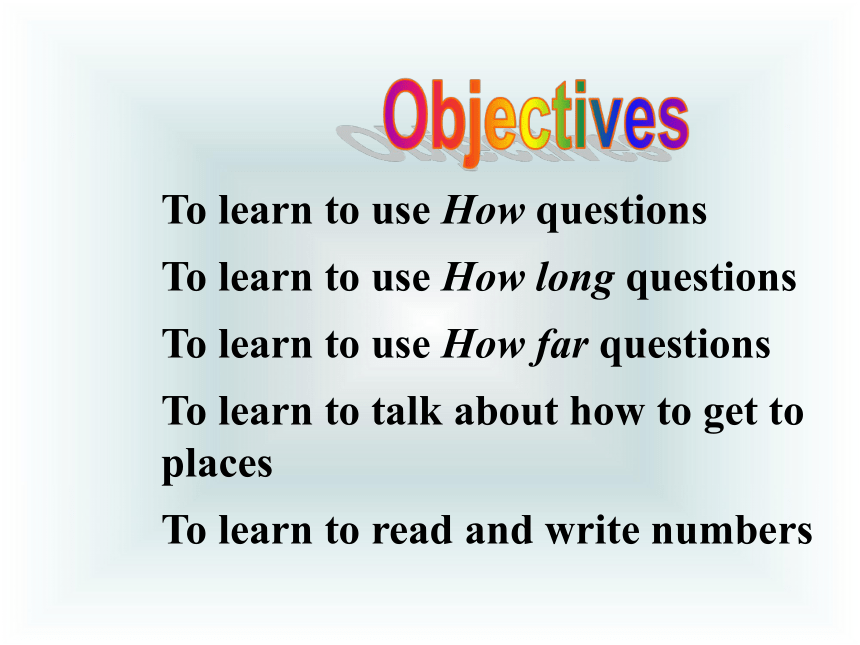
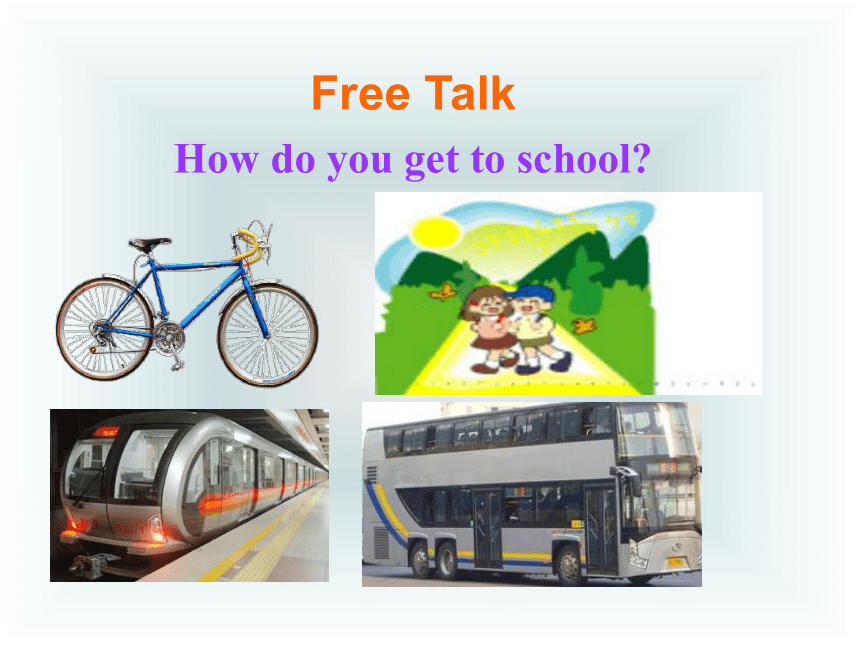
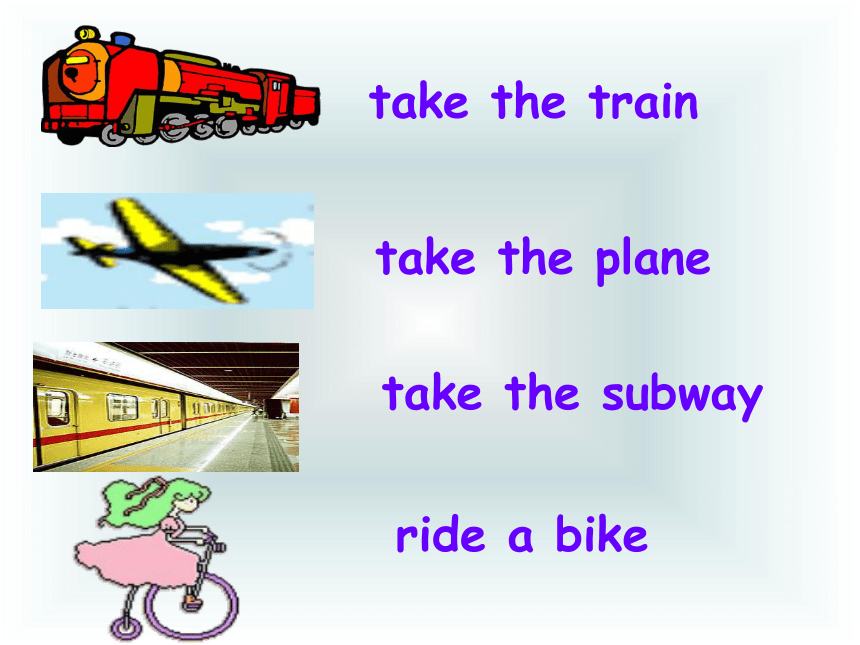
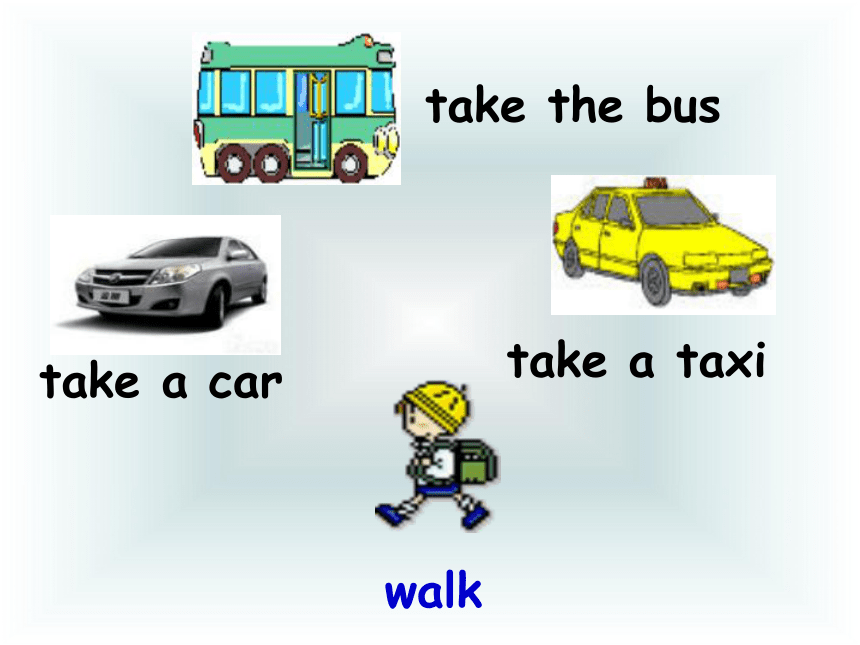
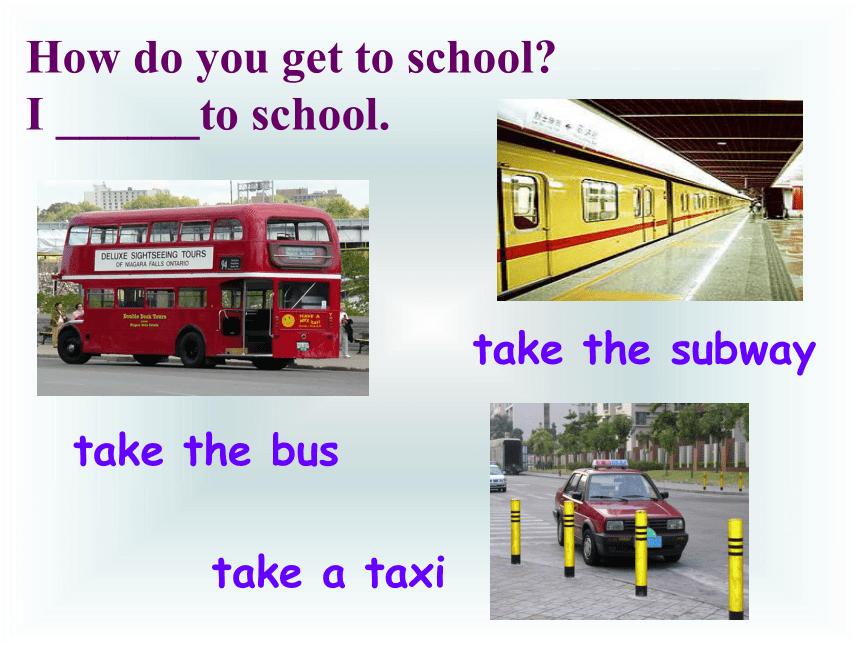

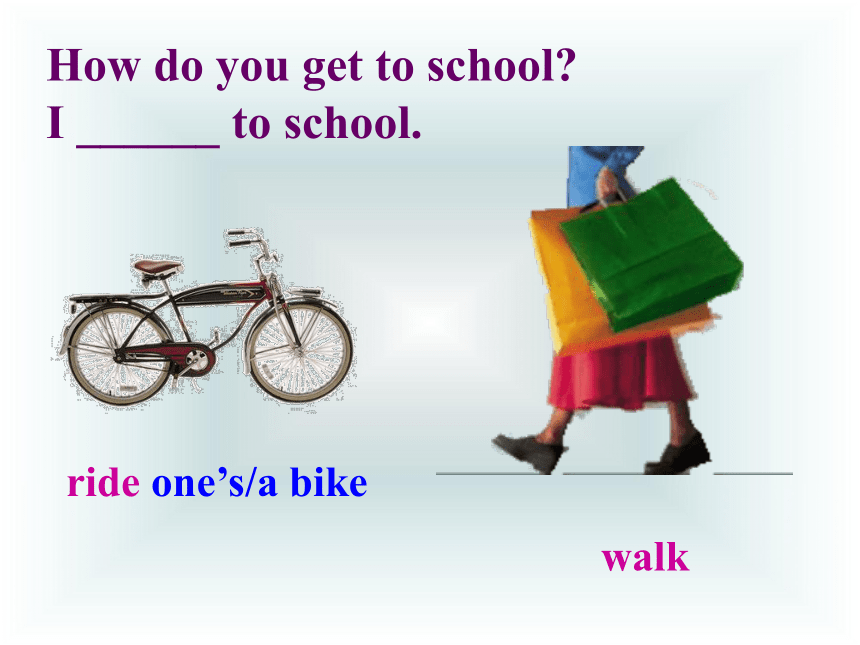
文档简介
(共140张PPT)
Section A
Period One
train
bus
subway
take the subway
ride
bike
ride a bike
n. 火车
n. 公共汽车
n. 地铁
乘地铁
v.骑
n.旅程
n. 自行车
骑自行车
Words & Expressions
sixty
seventy
eighty
ninety
hundred
minute
far
num.六十
num.七十
num. 八十
num. 九十
num.一百
n. 分钟
adv.&adj. 远;远的
Words & Expressions
kilometer
new
every
every day
by
by bike
n. (=kilometre)千米;公里
adj. 新的;刚出现的
adj. 每一;每个
每天
prep. (表示方式) 乘 (交通工具)
骑自行车
Words & Expressions
To learn to use How questions
To learn to use How long questions
To learn to use How far questions
To learn to talk about how to get to places
To learn to read and write numbers
Free Talk
How do you get to school
take the train
ride a bike
take the plane
take the subway
take the bus
take a taxi
walk
take a car
How do you get to school
I ______to school.
take the subway
take the bus
take a taxi
take the plane
take a car
take the train
How do you get to Beijing
I ______to Beijing.
walk
How do you get to school
I ______ to school.
ride one’s/a bike
A: How do you get to school
walk
ride a bike
take the bus
take a car
take the subway
take the train
B:
to school.
How does he get to work
= Yao Ming gets to work by bike every day.
Yao Ming rides a bike to work every day.
bike = bicycle
Liu Yifei often takes a car to work.
=Liu Yifei often gets to work by car.
car
How does she get to work
Han Geng often takes the bus to work.
= Han Geng often gets to work by bus.
bus
Han Geng
How does he get to work
Jay sometimes takes the train to work.
= Jay sometimes gets to work by train.
Jay
train
How does he get to work
Liu Xiang usually takes the subway to work.
= Liu Xiang usually gets to work by subway.
Liu Xiang
How does he get to work
= Zhou Bichang usually gets to school
on foot.
Zhou Bichang usually walks to school.
walk
Zhou Bichang
How does he get to work
A: How do you get to…
B: I take/ride …
I get to school by …
Match the words with the pictures.
1a
take the train ___ 2. take the bus ___
3. take the subway ___ 4. ride a bike ___
5. walk ____
d
e
a
b
c
Bob 2. Mary
3. John 4. Paul
5. Yang Lan 6. Jim
Listen and write the numbers next to the correct students in the picture.
1b
2
3
4
6
5
1c
Look at the picture in 1a. How do the students get to school Make conversations with your partner.
A: How does Mary get to school
B: She takes the subway.
2a
Listen and repeat. Then write the correct number next to the word.
84 105 99 200 72 61
sixty-one ____
ninety-nine ___
seventy-two ___
one hundred and five ___
eighty-four ___
two hundred ___
72
99
105
200
61
84
2b
Listen and complete the chart.
How How long (minutes) How far (kilometers)
Tom
Jane
2c
Listen again. Check your answers in 2b.
2
20
1 hour 30 minutes
60
walk
take the bus
2d
Student A is Jane and Student B is Tom. Use the information in 2b to make conversations.
A: How do you get to school
B: I …
A: How long does it take …
B: It takes …
A: How far is it from … to …
B: It’s about …
Make a conversation about how you
get to school.
A: How do you get to school
B: Well, I usually walk but
sometimes I take the bus.
A: How long does it take
B: It takes about 25 minutes to
walk and 10 minutes by bus.
Boy: How do you get to school Girl: I take the train. Boy: How long does it take Girl: Oh, around forty minutes. How
about you Boy: I take the subway. Girl: How long does that take Boy: Oh, around thirty-five minutes.
Sample 1
Sample 2
Girl: How do you get to school, Tom Tom: I ride my bike. Girl: How long does it take Tom: It takes around twenty-five
minutes. How do you get to
school Girl: I walk. Tom: And how long does that take Girl: It only takes ten minutes.
2e
Role-play the conversation.
Lisa: Hey, Jane. Is this your new bike
Jane: Yes. I ride it to school every day.
How do you get to school
Lisa: I usually take the bus.
Jane: How far is it from your home to
school
Lisa: I’m not sure… about 10 kilometers
The bus ride takes about 20 minutes.
How long does it take you to get to
school
Jane: About 15 minutes by bike. It’s good
exercise.
Lisa: Yeah. Well, have a good day at
school.
Jane: You, too.
关于 how 的用法
how adv. 指范围、程度、数量、价值等的“多少、多么”。
用于疑问句中,表示身体怎样。
How is your brother
你哥哥身体好吗?
2) 用于疑问句中,表示多少、什么程度。
How old is he
他多大年纪?
How much baggage am I allowed to take
我可以带多少行李?
I don’t know how far to rely on him.
我不知道应该依靠他到什么程度。
How far is it from your home to school
你家离学校有多远?
How is the U.S. dollar today
今天美元市价多少?
How long does it take you to get from home to school
你从家到学校要多久?
3)(指方式、方法)怎样,怎么 How did you climb to the top of that building 你是如何爬上楼顶的
How do you get to school
你是如何去学校的?
4) 用于惊叹句中,表示多么、何等。
How well you look!
你看起来多么健康啊!
How I wish to have a long vacation these days! 这些天我多么希望去度一次长假啊!
1. I’m not sure.
我不很肯定。(我不大有把握。)
这是一句表现自己对判断没有十足把握时的固定套语,可以模仿使用。其中的形容词sure表示“肯定的;确定的”,它的疑问形式和肯定形式在口语中也十分常用:
Are you sure 你确定吗?
I’m (quite) sure. 我(十分)肯定。
2. –How long does it take you to get to
school 你到学校要用多少时间?
-- About 15 minutes by bike.
骑自行车大约15分钟。
1) It takes+人+时间+to do…(事情)是一个十分常用的句型,其中动词take表示“花费(时间)”。如:
It takes me about half an hour to get to the airport.
我到机场大概需要半小时。
其中“时间”可用long(长久)、a short time(短时)等来表示。另外,“人”和“所做的事情”则可视具体的上下文进行省略。如:
It doesn’t take long to walk to school.
走着去学校花不了多长时间。
It’ll only take you a short time.
只花你一小会儿时间。
2) “by+交通工具”属固定介词短语,表示“乘坐、使用某种交通工具”。如:
by bus 乘公交车
by train 坐火车
by bike 骑自行车
by air 坐飞机
by boat 乘船
请注意,英语中on foot表示“步行;走路”,而不是by foot或on feet.
Read
35 minutes
55 minutes
30 minutes
40 minutes
39 minutes
50 minutes
10 minutes
15 minutes
25 minutes
分钟
How do I usually get to school
How long does it take
+
walk
take the bus
It takes ten minutes.
It takes thirty minutes.
30+10 = 40
It takes forty minutes.
Leave home
Go to school
6:45 a.m.
7:15 a.m.
6:45 a.m.
6:50 a.m.
-- How long does it take
-- It takes…
6:45 a.m.
6:55 a.m.
My house
school
6:45 a.m.
7:00 a.m.
10 minutes
25 minutes
8 minutes
How long does it take you to school It takes me 10 minutes to get to school by bus.
20 minutes
2 hours
12 minutes
How long does it take you to school It takes me 10 minutes to get to school by bus.
10 minutes
half an hour
1 hour
1.5 hours
How long does it take Zhou Bichang to get to the cinema
快速抢答
cinema
How do you get to school
I ride my bike.
How does she get to school
She usually takes the bus.
How long does it take to get to school
It takes about 15 minutes.
How far is it from your home to school
It’s only about two kilometers.
Grammar
Focus
课时重点回顾
Does Jane walk to school
No, she doesn’t. She goes by bike.
Do they take the bus to school
No, they don’t. They walk.
课时重点回顾
1. ride a bike = by bike 骑自行车
2. take the subway = by subway 乘坐地铁
3. take the train = by train 乘坐火车
4. take a car = by car 乘坐小车
5. take a plane = by plane 乘坐飞机
6. take the bus = by bus 乘坐公车
7. take a boat = by boat 乘坐船
8. walks = on foot 走路、步行
9. get to 到达
10. It takes sb. some time to do sth.
花某人多长时间做某事
Section A
Period Two
drive
car
live
v. 开车
n. 小汽车;轿车
v. 居住;生活
Words & Expressions
To learn to ask and answer How questions
To learn to ask and answer How long questions
To learn to ask and answer How far questions
How do they get to the zoo
How does she get to school
How do they get to Beijing
How do they get to the park
10 minutes
25 minutes
8 minutes
How long does it take you to school It takes me 10 minutes to get to school by bus.
20 minutes
2 hours
12 minutes
How long does it take you to school It takes me 10 minutes to get to school by bus.
10 minutes
half an hour
1 hour
1.5 hours
How long does it take Zhou Bichang to get to the cinema
快速抢答
cinema
Free Talk
How do you get to school
How long does it take
How far is it from your home to school
3a
Match the questions with the answers. Then practice them.
How does Mike get to school
2. How long does it take to get home
3. How far is it from here
4. Do your friends go to school by bus
5. Does your dad drive his car to work
a. Yes, they do.
b. No, he doesn’t.
c. He rides his bike.
d. It’s five kilometers.
e. About 15 minutes.
c
e
d
a
b
Use these words to make questions. Then ask and answer them.
3b
school/you/get to/do/how
________________________
___________________________
2. to/school/get to/does/how long/take/it
________________________________
________________________________
_____________________
3. school/your/from/it/is/how far/home/to
__________________________________
__________________________
How do you get to school
How long does it take to get to school
How far is it from your home to school
I/we go to school by bus/train…
It takes an hour/30 minutes/half an hour to get to school.
It’s 30 kilometers/20 meters…
4. you/to/walk/do/school
____________________
_______________________________
_______________
5. ride/their bikes/do/school/your friends/to
____________________________________
_________________________________
_________________________________
______________________
Do you walk to school
Do your friends ride their bikes to school
Yes, I do./No, I don’t. I go to school by bus/train…
Yes, they do./No, they don’t. They go to school by subway/bus…/They take the subway/train… to school.
3c
Ask your classmates questions and write their names in the chart. The first student to fill in all the blanks wins!
Tips for teacher
Let the word fly 板块是帮助学生
学习一些一词多义、熟词生意的词
汇。通过此环节,学生可以对一些
常见词的用法、意思有一个透彻的
了解。
携带
乘坐
接受
移开
买下
写下
吃
考虑
to carry
to consider
to remove
to eat
to write down
to buy
by
to accept
take
1. to carry; to lead 携带,拿走,取走
Don’t forget to take your bag when you go.
你走的时候别忘了带上书包。
2. to accept; to receive 接受;收到
I take your point, but I still don’t think
you should have gone.
我接受你的观点, 可我还是觉得你不应
该去。
3. to use as transport 乘、坐(某一交通工具)
Mr. Smith often takes a train to work.
史密斯先生经常乘火车上班。
4. to choose; to buy; to rent 选中, 买下, 租用
That’s cheap. I’ll take it.
那很便宜,我买下了。
5. to get sth. 得到, 获得
He took a seat near a window.
他靠窗户坐下。
6. to write down 写下
You should take notes during the lecture.
在课堂上,你应该记笔记。
7. to eat; to drink 吃(饭), 喝(水), 服(药)
Take this medicine every four hours and
stay in bed for two days.
每隔四小时服用这些药,卧床休息两天。
8. to need or require a particular amount
of time 花费时间;需要(多长)时间
It takes him an hour to do his homework
in the evening.
晚上他要花一小时做作业。
9. to remove 移开
Here’s your pen, I took it by mistake.
这是你的钢笔,我拿错了。
take off 起飞
I’m afraid I have to go now. The plane
will take off soon.
我恐怕现在要走了。飞机快要起飞了。
10. to say that sb. is doing sth., performing an action, etc. (和名词连用)表举动、动作等
take a glance (or look) at 看一 眼(强调动作)
May I take a look at your new pen
我能看看你的新钢笔吗?
take a walk 散步
Taking a walk is good for you.
散步对你有好处。
11. to have a particular state 出现(状况)
take advantage of 利用
Otherwise, you will take no advantage of
opportunities when they come to visit you. 否则,机遇来临你却无法利用。
12. to consider 考虑
We’re taking the bomb threats very seriously.
我们认为这次的炸弹恐吓事件非常严重。
take…into consideration 考虑到, 把 …考虑进去
You should take the weather into consideration.
你应该把天气考虑在内。
13. to get possession or control of sth. 拥有, 控制
The king’s army easily took the enemy fortress.
国王的军队轻而易举地控制了敌人的城堡。
take charge of 负责管理(照顾)
John will take charge of the next meeting.
约翰将主持下一次会议。
活学活用
从上面给出的例句中我们可以看到 take的丰富含义。take 这个词非常活跃, 请大家在课后查字典整理其他词义或词组, 并选择你感兴趣的几个进行造句或对话练习。
课时重点回顾
--How do you get to school
--I walk/take the bus… to school.
--How long does it take to get home
--It takes an hour/20 minutes to get
home.
--How far is it from here
--It’s about …kilometers/meters.
--Do your friends go to school by bus
--Yes, they do./No, they don’t. They
go to school by subway/train…
Translate and write them down.
1. 林飞家离学校大约10千米。
2. - 从你家到学校有多远?
- 3英里。
Lin Fei’s home is about 10 kilometers from school.
How far is it from your home to school
It’s three miles.
3. 你家离学校有多远?
_____ ____ is it ______ your home to school
4. 在中国,自行车和公共汽车是最流行的
交通方式。
In China, bikes and buses _____ the
______popular ____________ of
________________.
most ways/means
transportation
How far from
are
A: _______________________
B: I usually ride my bike.
A: _______is it from your home to school
B: About 10 kilometers.
A: _________does it take
B: It ______me around 35 minutes.
Try to fill in the blanks.
How do you get to school
How far
How long
takes
Section B
Period One
stop
think of
n. 车站;停止
认为
Words & Expressions
To learn different kinds of transportation
To learn to use How questions to talk about the transportation
take the train
ride a bike
take the plane
take the subway
How do you get to school
take the bus
take a taxi
walk
take a car
How do your parents get to work
Free Talk
What kinds of transportation have you used
Where do you have to take them
eg. You have to go to the bus stop to
take a bus.
Do you know them
bus stop
bus station
train station
subway station
airport
This is an airport.
People take the
plane here.
Say something about one of the pictures.
Look! This is a…
It’s…
…stop here.
1a
Match the words with the pictures.
__ bus stop 3. __ bus station
2. __ train station 4. __ subway station
b
c
a
d
Tell your partner how you get to school. Imagine you use two type of transportation.
1b
A: How do you get to school
B: Well, I ride my bike to the subway
station. Then I take the subway.
A: How do you get to school
B: Well, I ride my motorbike
to the bus stop. Then I take
the double decker.
double decker (双层巴士)
Dialogue 1:
Dialogue 2:
A: How do you visit your grandmother
B: Well, I take the double decker
to the train station. Then I take
the “T” bullet train.
“T” bullet train 特快列车
Dialogue 3:
A: How do you see your friends
B: Well, I’d like to ride the bike.
That’s free!
bike
Name Nina
Age 14
Lifestyle Exercise, eat vegetables every day
Nationality American
Live in New Street, New York
Transportati-on to school First,
Next,
Then,
Finally,
What do you know about Nina
1c
Listen and check the things that
Mary wants to know.
Mary wants to know ….
__ where Bob lives.
__ how far he lives from his grandparents’
home.
__ how he gets to his grandparents’ home.
__ how long it takes to get to his
grandparents’ home.
__ what he thinks of the trip.
1d
Listen again. How does Bob get to
his grandparents’ home Check 1 or 2 below.
Talk about how Bob gets to his grandparents’ home.
1e
Groupwork
First he walks to the bus stop.
He takes a bus to the train station.
Then he takes the train.
Next he takes a bus from the train station to his aunt’s home.
Look at the picture to tell how Tom
gets to his aunt’s home.
Group work: How does Paul get to his uncle’ home
First, he…
Next, he…
Then, he…
At last, he..
Practice: I take the … to …
1
2
3
4
5
6
7
8
Talk like this:
A: I want to go to…
B: How do you get to …
A: Well, I ride my bike to the
subway station. Then I take
the subway.
A: How do you…
B: Well, I…
(Next I…)
Then,I…
Pair work
Pretend(假如) it’s 2050. How do you get
there (Use 2 0r 3 Kinds of transportation).
the North Pole
课时重点回顾
get to his grandparents’ home,
walk to the bus stop,
ride a bike to the subway station, think of the trip
take the subway
Translate and write them down.
- 你怎么去学校?
- 我骑自行车到地铁站,然后乘坐地铁。
- 妮娜怎么去学校?
- 她步行到公共汽车站,然后坐车。
How do you get to school
I ride my bike to the subway station.
Then I take the subway.
How does Nina get to school
She walks to the bus stop, and then takes
the bus.
从你家到学校大约要花多少时间?
How long does it take you to get from your home to school
中国的天气与澳大利亚的不一样。
The weather in China is different from that in Australia.
坐火车旅行比坐飞机有趣得多。
Traveling by train has a lot more fun
than by plane.
Section B
Period Two
cross
river
many
village
between
between…and…
bridge
boat
ropeway
v. 横过;越过
n. 河;江
adj.&pron. 许多
n. 村庄;村镇
prep. 介于……之间
在……和……之间
n. 桥
n. 小船
n. 索道
Words & Expressions
year
afraid
like
villager
leave
dream
true
come true
n. 年;岁
adj. 害怕;畏惧
prep. 像;怎么样
n. 村民
v.离开
n. 梦想;睡梦
v. 做梦
adj. 真的;符合事实的
实现;成为现实
Words & Expressions
To learn the students crossing the river to school
To learn to write how to get to places
Say something about one of the pictures.
Look! This is a…
It’s…
…stop here.
Group work: How does Paul gets to his uncle’s home
First, he…
Next, he…
Then, he…
At last, he..
Practice: … take the … to …
1
2
3
4
5
6
7
8
2a
Look at the picture and title below. Guess what the passage is about.
Crossing the River to School
2b
Read the passage and answer the questions.
1. How do the students in the village go to
school
2. Why do they go to school like this
They go on a ropeway to cross the river to school.
There is a very big river between their school and the village, and there is no bridge and the river runs too quickly for boats.
3. Does the boy like the this school Why
4. What is the villagers’ dream Do you
think their dream can come true How
Yes, he likes this school. Because he love to play with his classmates and also love his teacher who is like a father to him.
Their dream is to have a bridge.
Their dream can come true if people all around the world give a hand to them.
For the students in the village, it is ________ to get to school.
They have to cross a very ____ river between their school and the village.
They cannot go by boat because the river runs too _______.
difficult
big
quickly
2c
Read the passage again. Complete the sentences with words from the passage.
4.It is not easy to cross the river on a ropeway, but the boy is not ______.
5.The students and villagers want to have a bridge. Can their dream come ____
afraid
true
Hi there,
How are you Thanks for your last e-mail.
You want to know how I _____ school,
right Well, I usually ____ my home at
about 8:00 and ____ to the bus stop. The
school bus usually comes at about 8:15.
get to
leave
walk
3a
Read the e-mail from your pen pal Tom in the US. Fill in the blanks with the words in the box.
kilometers get to takes
walk boring leave
My school is about 20 _________ from my
home. It _____ about 40 minutes to get
there by bus. The bus ride is never ______
because I always talk to my classmates.
What about you How do you get to
school
Tom
kilometers
takes
boring
kilometers get to takes
walk boring leave
1. When do you leave home
2. How do you get to school
3. How far is it from your home to
school
4. How long does it take you to get to
school
5. How is like your trip to school
3b
Write an e-mail to Tom and tell him how you get to school. These questions may help you.
There is no bridge and the river runs too quickly for boats.
(河上)完全没有桥梁,而且河水湍急,不宜小船摆渡。
1)此句是英语否定结构的一种。当no用于构成否定句,主要用于名词之前,强调否定其后的名词,表现“完全不;根本没有”。如:
There are no computers in that small mountain village.
在那个小山村里根本就没有电脑。
There is no fruits in the fridge.
冰箱里没有水果。
2)run表示“液体的流动”,在不同的语境下分别有不同的用法和含义。例如:
The river runs into the sea.
这条河流入大海。
Your nose is running, Jack. Do you have a cold
杰克,你在流鼻涕。是不是感冒了?
2. One 11-year-old boy, Liangliang, crosses the river every school day.
亮亮,一个11岁男孩,每天过河上学。
1)11-year-old构成一个复合形容词,修饰名词boy。请注意其中的year之后没有复数词尾-s。这一构词结构较为常见。如:
a four-day trip 一个四天的旅行
a 30-page book 一本30页的书
a three-room house 一个三间屋的房子
2) school day是英语中一种常见的短语(或表达方式),指在校学生上学的日子,尤指周一至周五。与之相对应的词是holiday节假日;假期(英式),vacation假期(美式),以及weekend周末。如:
I can’t watch TV on school days, and I can only watch for two hours on the weekend.
在周一到周五上学期间时我不能看电视,在周末我也不过只能看两小时。
3. The bus ride is never boring because…
坐公交车从来不会无聊,因为……
ride作为名词,表示“乘车;行程”。如:
can you give me a ride to the train station
你能开车送我去火车站吗?
ride作为动词,表示“乘车;乘坐;搭乘”。如:
Jack often rides his bike to school.
杰克经常骑自行车去上学。
课时重点回顾
cross the river to school,
many students, be (not) afraid,
easy/difficult to get to school, between … and …, come true
The river runs too quickly for boats.
go on a ropeway to cross the river to school, love to play with my classmates,
many of the students…, like a father
It is their dream to have a bridge.
Translate and write them down.
1. 世界各地的学生怎么去学校?
2. 在美国,大部分学生坐校车去上学。
3. 自行车和公共汽车是最流行的两种交
通方式。
How do students around the world get to school
In America, most students go to school on the school bus.
Bikes and buses are the most popular means of transportation.
4. 在北美,并非所有的学生都坐公共汽车
上学。
In North America, not all the students
take the bus to school.
5. 每天我大约6:30启程前往学校。
I leave for school at about/around half
past six every day.
Section A
Period One
train
bus
subway
take the subway
ride
bike
ride a bike
n. 火车
n. 公共汽车
n. 地铁
乘地铁
v.骑
n.旅程
n. 自行车
骑自行车
Words & Expressions
sixty
seventy
eighty
ninety
hundred
minute
far
num.六十
num.七十
num. 八十
num. 九十
num.一百
n. 分钟
adv.&adj. 远;远的
Words & Expressions
kilometer
new
every
every day
by
by bike
n. (=kilometre)千米;公里
adj. 新的;刚出现的
adj. 每一;每个
每天
prep. (表示方式) 乘 (交通工具)
骑自行车
Words & Expressions
To learn to use How questions
To learn to use How long questions
To learn to use How far questions
To learn to talk about how to get to places
To learn to read and write numbers
Free Talk
How do you get to school
take the train
ride a bike
take the plane
take the subway
take the bus
take a taxi
walk
take a car
How do you get to school
I ______to school.
take the subway
take the bus
take a taxi
take the plane
take a car
take the train
How do you get to Beijing
I ______to Beijing.
walk
How do you get to school
I ______ to school.
ride one’s/a bike
A: How do you get to school
walk
ride a bike
take the bus
take a car
take the subway
take the train
B:
to school.
How does he get to work
= Yao Ming gets to work by bike every day.
Yao Ming rides a bike to work every day.
bike = bicycle
Liu Yifei often takes a car to work.
=Liu Yifei often gets to work by car.
car
How does she get to work
Han Geng often takes the bus to work.
= Han Geng often gets to work by bus.
bus
Han Geng
How does he get to work
Jay sometimes takes the train to work.
= Jay sometimes gets to work by train.
Jay
train
How does he get to work
Liu Xiang usually takes the subway to work.
= Liu Xiang usually gets to work by subway.
Liu Xiang
How does he get to work
= Zhou Bichang usually gets to school
on foot.
Zhou Bichang usually walks to school.
walk
Zhou Bichang
How does he get to work
A: How do you get to…
B: I take/ride …
I get to school by …
Match the words with the pictures.
1a
take the train ___ 2. take the bus ___
3. take the subway ___ 4. ride a bike ___
5. walk ____
d
e
a
b
c
Bob 2. Mary
3. John 4. Paul
5. Yang Lan 6. Jim
Listen and write the numbers next to the correct students in the picture.
1b
2
3
4
6
5
1c
Look at the picture in 1a. How do the students get to school Make conversations with your partner.
A: How does Mary get to school
B: She takes the subway.
2a
Listen and repeat. Then write the correct number next to the word.
84 105 99 200 72 61
sixty-one ____
ninety-nine ___
seventy-two ___
one hundred and five ___
eighty-four ___
two hundred ___
72
99
105
200
61
84
2b
Listen and complete the chart.
How How long (minutes) How far (kilometers)
Tom
Jane
2c
Listen again. Check your answers in 2b.
2
20
1 hour 30 minutes
60
walk
take the bus
2d
Student A is Jane and Student B is Tom. Use the information in 2b to make conversations.
A: How do you get to school
B: I …
A: How long does it take …
B: It takes …
A: How far is it from … to …
B: It’s about …
Make a conversation about how you
get to school.
A: How do you get to school
B: Well, I usually walk but
sometimes I take the bus.
A: How long does it take
B: It takes about 25 minutes to
walk and 10 minutes by bus.
Boy: How do you get to school Girl: I take the train. Boy: How long does it take Girl: Oh, around forty minutes. How
about you Boy: I take the subway. Girl: How long does that take Boy: Oh, around thirty-five minutes.
Sample 1
Sample 2
Girl: How do you get to school, Tom Tom: I ride my bike. Girl: How long does it take Tom: It takes around twenty-five
minutes. How do you get to
school Girl: I walk. Tom: And how long does that take Girl: It only takes ten minutes.
2e
Role-play the conversation.
Lisa: Hey, Jane. Is this your new bike
Jane: Yes. I ride it to school every day.
How do you get to school
Lisa: I usually take the bus.
Jane: How far is it from your home to
school
Lisa: I’m not sure… about 10 kilometers
The bus ride takes about 20 minutes.
How long does it take you to get to
school
Jane: About 15 minutes by bike. It’s good
exercise.
Lisa: Yeah. Well, have a good day at
school.
Jane: You, too.
关于 how 的用法
how adv. 指范围、程度、数量、价值等的“多少、多么”。
用于疑问句中,表示身体怎样。
How is your brother
你哥哥身体好吗?
2) 用于疑问句中,表示多少、什么程度。
How old is he
他多大年纪?
How much baggage am I allowed to take
我可以带多少行李?
I don’t know how far to rely on him.
我不知道应该依靠他到什么程度。
How far is it from your home to school
你家离学校有多远?
How is the U.S. dollar today
今天美元市价多少?
How long does it take you to get from home to school
你从家到学校要多久?
3)(指方式、方法)怎样,怎么 How did you climb to the top of that building 你是如何爬上楼顶的
How do you get to school
你是如何去学校的?
4) 用于惊叹句中,表示多么、何等。
How well you look!
你看起来多么健康啊!
How I wish to have a long vacation these days! 这些天我多么希望去度一次长假啊!
1. I’m not sure.
我不很肯定。(我不大有把握。)
这是一句表现自己对判断没有十足把握时的固定套语,可以模仿使用。其中的形容词sure表示“肯定的;确定的”,它的疑问形式和肯定形式在口语中也十分常用:
Are you sure 你确定吗?
I’m (quite) sure. 我(十分)肯定。
2. –How long does it take you to get to
school 你到学校要用多少时间?
-- About 15 minutes by bike.
骑自行车大约15分钟。
1) It takes+人+时间+to do…(事情)是一个十分常用的句型,其中动词take表示“花费(时间)”。如:
It takes me about half an hour to get to the airport.
我到机场大概需要半小时。
其中“时间”可用long(长久)、a short time(短时)等来表示。另外,“人”和“所做的事情”则可视具体的上下文进行省略。如:
It doesn’t take long to walk to school.
走着去学校花不了多长时间。
It’ll only take you a short time.
只花你一小会儿时间。
2) “by+交通工具”属固定介词短语,表示“乘坐、使用某种交通工具”。如:
by bus 乘公交车
by train 坐火车
by bike 骑自行车
by air 坐飞机
by boat 乘船
请注意,英语中on foot表示“步行;走路”,而不是by foot或on feet.
Read
35 minutes
55 minutes
30 minutes
40 minutes
39 minutes
50 minutes
10 minutes
15 minutes
25 minutes
分钟
How do I usually get to school
How long does it take
+
walk
take the bus
It takes ten minutes.
It takes thirty minutes.
30+10 = 40
It takes forty minutes.
Leave home
Go to school
6:45 a.m.
7:15 a.m.
6:45 a.m.
6:50 a.m.
-- How long does it take
-- It takes…
6:45 a.m.
6:55 a.m.
My house
school
6:45 a.m.
7:00 a.m.
10 minutes
25 minutes
8 minutes
How long does it take you to school It takes me 10 minutes to get to school by bus.
20 minutes
2 hours
12 minutes
How long does it take you to school It takes me 10 minutes to get to school by bus.
10 minutes
half an hour
1 hour
1.5 hours
How long does it take Zhou Bichang to get to the cinema
快速抢答
cinema
How do you get to school
I ride my bike.
How does she get to school
She usually takes the bus.
How long does it take to get to school
It takes about 15 minutes.
How far is it from your home to school
It’s only about two kilometers.
Grammar
Focus
课时重点回顾
Does Jane walk to school
No, she doesn’t. She goes by bike.
Do they take the bus to school
No, they don’t. They walk.
课时重点回顾
1. ride a bike = by bike 骑自行车
2. take the subway = by subway 乘坐地铁
3. take the train = by train 乘坐火车
4. take a car = by car 乘坐小车
5. take a plane = by plane 乘坐飞机
6. take the bus = by bus 乘坐公车
7. take a boat = by boat 乘坐船
8. walks = on foot 走路、步行
9. get to 到达
10. It takes sb. some time to do sth.
花某人多长时间做某事
Section A
Period Two
drive
car
live
v. 开车
n. 小汽车;轿车
v. 居住;生活
Words & Expressions
To learn to ask and answer How questions
To learn to ask and answer How long questions
To learn to ask and answer How far questions
How do they get to the zoo
How does she get to school
How do they get to Beijing
How do they get to the park
10 minutes
25 minutes
8 minutes
How long does it take you to school It takes me 10 minutes to get to school by bus.
20 minutes
2 hours
12 minutes
How long does it take you to school It takes me 10 minutes to get to school by bus.
10 minutes
half an hour
1 hour
1.5 hours
How long does it take Zhou Bichang to get to the cinema
快速抢答
cinema
Free Talk
How do you get to school
How long does it take
How far is it from your home to school
3a
Match the questions with the answers. Then practice them.
How does Mike get to school
2. How long does it take to get home
3. How far is it from here
4. Do your friends go to school by bus
5. Does your dad drive his car to work
a. Yes, they do.
b. No, he doesn’t.
c. He rides his bike.
d. It’s five kilometers.
e. About 15 minutes.
c
e
d
a
b
Use these words to make questions. Then ask and answer them.
3b
school/you/get to/do/how
________________________
___________________________
2. to/school/get to/does/how long/take/it
________________________________
________________________________
_____________________
3. school/your/from/it/is/how far/home/to
__________________________________
__________________________
How do you get to school
How long does it take to get to school
How far is it from your home to school
I/we go to school by bus/train…
It takes an hour/30 minutes/half an hour to get to school.
It’s 30 kilometers/20 meters…
4. you/to/walk/do/school
____________________
_______________________________
_______________
5. ride/their bikes/do/school/your friends/to
____________________________________
_________________________________
_________________________________
______________________
Do you walk to school
Do your friends ride their bikes to school
Yes, I do./No, I don’t. I go to school by bus/train…
Yes, they do./No, they don’t. They go to school by subway/bus…/They take the subway/train… to school.
3c
Ask your classmates questions and write their names in the chart. The first student to fill in all the blanks wins!
Tips for teacher
Let the word fly 板块是帮助学生
学习一些一词多义、熟词生意的词
汇。通过此环节,学生可以对一些
常见词的用法、意思有一个透彻的
了解。
携带
乘坐
接受
移开
买下
写下
吃
考虑
to carry
to consider
to remove
to eat
to write down
to buy
by
to accept
take
1. to carry; to lead 携带,拿走,取走
Don’t forget to take your bag when you go.
你走的时候别忘了带上书包。
2. to accept; to receive 接受;收到
I take your point, but I still don’t think
you should have gone.
我接受你的观点, 可我还是觉得你不应
该去。
3. to use as transport 乘、坐(某一交通工具)
Mr. Smith often takes a train to work.
史密斯先生经常乘火车上班。
4. to choose; to buy; to rent 选中, 买下, 租用
That’s cheap. I’ll take it.
那很便宜,我买下了。
5. to get sth. 得到, 获得
He took a seat near a window.
他靠窗户坐下。
6. to write down 写下
You should take notes during the lecture.
在课堂上,你应该记笔记。
7. to eat; to drink 吃(饭), 喝(水), 服(药)
Take this medicine every four hours and
stay in bed for two days.
每隔四小时服用这些药,卧床休息两天。
8. to need or require a particular amount
of time 花费时间;需要(多长)时间
It takes him an hour to do his homework
in the evening.
晚上他要花一小时做作业。
9. to remove 移开
Here’s your pen, I took it by mistake.
这是你的钢笔,我拿错了。
take off 起飞
I’m afraid I have to go now. The plane
will take off soon.
我恐怕现在要走了。飞机快要起飞了。
10. to say that sb. is doing sth., performing an action, etc. (和名词连用)表举动、动作等
take a glance (or look) at 看一 眼(强调动作)
May I take a look at your new pen
我能看看你的新钢笔吗?
take a walk 散步
Taking a walk is good for you.
散步对你有好处。
11. to have a particular state 出现(状况)
take advantage of 利用
Otherwise, you will take no advantage of
opportunities when they come to visit you. 否则,机遇来临你却无法利用。
12. to consider 考虑
We’re taking the bomb threats very seriously.
我们认为这次的炸弹恐吓事件非常严重。
take…into consideration 考虑到, 把 …考虑进去
You should take the weather into consideration.
你应该把天气考虑在内。
13. to get possession or control of sth. 拥有, 控制
The king’s army easily took the enemy fortress.
国王的军队轻而易举地控制了敌人的城堡。
take charge of 负责管理(照顾)
John will take charge of the next meeting.
约翰将主持下一次会议。
活学活用
从上面给出的例句中我们可以看到 take的丰富含义。take 这个词非常活跃, 请大家在课后查字典整理其他词义或词组, 并选择你感兴趣的几个进行造句或对话练习。
课时重点回顾
--How do you get to school
--I walk/take the bus… to school.
--How long does it take to get home
--It takes an hour/20 minutes to get
home.
--How far is it from here
--It’s about …kilometers/meters.
--Do your friends go to school by bus
--Yes, they do./No, they don’t. They
go to school by subway/train…
Translate and write them down.
1. 林飞家离学校大约10千米。
2. - 从你家到学校有多远?
- 3英里。
Lin Fei’s home is about 10 kilometers from school.
How far is it from your home to school
It’s three miles.
3. 你家离学校有多远?
_____ ____ is it ______ your home to school
4. 在中国,自行车和公共汽车是最流行的
交通方式。
In China, bikes and buses _____ the
______popular ____________ of
________________.
most ways/means
transportation
How far from
are
A: _______________________
B: I usually ride my bike.
A: _______is it from your home to school
B: About 10 kilometers.
A: _________does it take
B: It ______me around 35 minutes.
Try to fill in the blanks.
How do you get to school
How far
How long
takes
Section B
Period One
stop
think of
n. 车站;停止
认为
Words & Expressions
To learn different kinds of transportation
To learn to use How questions to talk about the transportation
take the train
ride a bike
take the plane
take the subway
How do you get to school
take the bus
take a taxi
walk
take a car
How do your parents get to work
Free Talk
What kinds of transportation have you used
Where do you have to take them
eg. You have to go to the bus stop to
take a bus.
Do you know them
bus stop
bus station
train station
subway station
airport
This is an airport.
People take the
plane here.
Say something about one of the pictures.
Look! This is a…
It’s…
…stop here.
1a
Match the words with the pictures.
__ bus stop 3. __ bus station
2. __ train station 4. __ subway station
b
c
a
d
Tell your partner how you get to school. Imagine you use two type of transportation.
1b
A: How do you get to school
B: Well, I ride my bike to the subway
station. Then I take the subway.
A: How do you get to school
B: Well, I ride my motorbike
to the bus stop. Then I take
the double decker.
double decker (双层巴士)
Dialogue 1:
Dialogue 2:
A: How do you visit your grandmother
B: Well, I take the double decker
to the train station. Then I take
the “T” bullet train.
“T” bullet train 特快列车
Dialogue 3:
A: How do you see your friends
B: Well, I’d like to ride the bike.
That’s free!
bike
Name Nina
Age 14
Lifestyle Exercise, eat vegetables every day
Nationality American
Live in New Street, New York
Transportati-on to school First,
Next,
Then,
Finally,
What do you know about Nina
1c
Listen and check the things that
Mary wants to know.
Mary wants to know ….
__ where Bob lives.
__ how far he lives from his grandparents’
home.
__ how he gets to his grandparents’ home.
__ how long it takes to get to his
grandparents’ home.
__ what he thinks of the trip.
1d
Listen again. How does Bob get to
his grandparents’ home Check 1 or 2 below.
Talk about how Bob gets to his grandparents’ home.
1e
Groupwork
First he walks to the bus stop.
He takes a bus to the train station.
Then he takes the train.
Next he takes a bus from the train station to his aunt’s home.
Look at the picture to tell how Tom
gets to his aunt’s home.
Group work: How does Paul get to his uncle’ home
First, he…
Next, he…
Then, he…
At last, he..
Practice: I take the … to …
1
2
3
4
5
6
7
8
Talk like this:
A: I want to go to…
B: How do you get to …
A: Well, I ride my bike to the
subway station. Then I take
the subway.
A: How do you…
B: Well, I…
(Next I…)
Then,I…
Pair work
Pretend(假如) it’s 2050. How do you get
there (Use 2 0r 3 Kinds of transportation).
the North Pole
课时重点回顾
get to his grandparents’ home,
walk to the bus stop,
ride a bike to the subway station, think of the trip
take the subway
Translate and write them down.
- 你怎么去学校?
- 我骑自行车到地铁站,然后乘坐地铁。
- 妮娜怎么去学校?
- 她步行到公共汽车站,然后坐车。
How do you get to school
I ride my bike to the subway station.
Then I take the subway.
How does Nina get to school
She walks to the bus stop, and then takes
the bus.
从你家到学校大约要花多少时间?
How long does it take you to get from your home to school
中国的天气与澳大利亚的不一样。
The weather in China is different from that in Australia.
坐火车旅行比坐飞机有趣得多。
Traveling by train has a lot more fun
than by plane.
Section B
Period Two
cross
river
many
village
between
between…and…
bridge
boat
ropeway
v. 横过;越过
n. 河;江
adj.&pron. 许多
n. 村庄;村镇
prep. 介于……之间
在……和……之间
n. 桥
n. 小船
n. 索道
Words & Expressions
year
afraid
like
villager
leave
dream
true
come true
n. 年;岁
adj. 害怕;畏惧
prep. 像;怎么样
n. 村民
v.离开
n. 梦想;睡梦
v. 做梦
adj. 真的;符合事实的
实现;成为现实
Words & Expressions
To learn the students crossing the river to school
To learn to write how to get to places
Say something about one of the pictures.
Look! This is a…
It’s…
…stop here.
Group work: How does Paul gets to his uncle’s home
First, he…
Next, he…
Then, he…
At last, he..
Practice: … take the … to …
1
2
3
4
5
6
7
8
2a
Look at the picture and title below. Guess what the passage is about.
Crossing the River to School
2b
Read the passage and answer the questions.
1. How do the students in the village go to
school
2. Why do they go to school like this
They go on a ropeway to cross the river to school.
There is a very big river between their school and the village, and there is no bridge and the river runs too quickly for boats.
3. Does the boy like the this school Why
4. What is the villagers’ dream Do you
think their dream can come true How
Yes, he likes this school. Because he love to play with his classmates and also love his teacher who is like a father to him.
Their dream is to have a bridge.
Their dream can come true if people all around the world give a hand to them.
For the students in the village, it is ________ to get to school.
They have to cross a very ____ river between their school and the village.
They cannot go by boat because the river runs too _______.
difficult
big
quickly
2c
Read the passage again. Complete the sentences with words from the passage.
4.It is not easy to cross the river on a ropeway, but the boy is not ______.
5.The students and villagers want to have a bridge. Can their dream come ____
afraid
true
Hi there,
How are you Thanks for your last e-mail.
You want to know how I _____ school,
right Well, I usually ____ my home at
about 8:00 and ____ to the bus stop. The
school bus usually comes at about 8:15.
get to
leave
walk
3a
Read the e-mail from your pen pal Tom in the US. Fill in the blanks with the words in the box.
kilometers get to takes
walk boring leave
My school is about 20 _________ from my
home. It _____ about 40 minutes to get
there by bus. The bus ride is never ______
because I always talk to my classmates.
What about you How do you get to
school
Tom
kilometers
takes
boring
kilometers get to takes
walk boring leave
1. When do you leave home
2. How do you get to school
3. How far is it from your home to
school
4. How long does it take you to get to
school
5. How is like your trip to school
3b
Write an e-mail to Tom and tell him how you get to school. These questions may help you.
There is no bridge and the river runs too quickly for boats.
(河上)完全没有桥梁,而且河水湍急,不宜小船摆渡。
1)此句是英语否定结构的一种。当no用于构成否定句,主要用于名词之前,强调否定其后的名词,表现“完全不;根本没有”。如:
There are no computers in that small mountain village.
在那个小山村里根本就没有电脑。
There is no fruits in the fridge.
冰箱里没有水果。
2)run表示“液体的流动”,在不同的语境下分别有不同的用法和含义。例如:
The river runs into the sea.
这条河流入大海。
Your nose is running, Jack. Do you have a cold
杰克,你在流鼻涕。是不是感冒了?
2. One 11-year-old boy, Liangliang, crosses the river every school day.
亮亮,一个11岁男孩,每天过河上学。
1)11-year-old构成一个复合形容词,修饰名词boy。请注意其中的year之后没有复数词尾-s。这一构词结构较为常见。如:
a four-day trip 一个四天的旅行
a 30-page book 一本30页的书
a three-room house 一个三间屋的房子
2) school day是英语中一种常见的短语(或表达方式),指在校学生上学的日子,尤指周一至周五。与之相对应的词是holiday节假日;假期(英式),vacation假期(美式),以及weekend周末。如:
I can’t watch TV on school days, and I can only watch for two hours on the weekend.
在周一到周五上学期间时我不能看电视,在周末我也不过只能看两小时。
3. The bus ride is never boring because…
坐公交车从来不会无聊,因为……
ride作为名词,表示“乘车;行程”。如:
can you give me a ride to the train station
你能开车送我去火车站吗?
ride作为动词,表示“乘车;乘坐;搭乘”。如:
Jack often rides his bike to school.
杰克经常骑自行车去上学。
课时重点回顾
cross the river to school,
many students, be (not) afraid,
easy/difficult to get to school, between … and …, come true
The river runs too quickly for boats.
go on a ropeway to cross the river to school, love to play with my classmates,
many of the students…, like a father
It is their dream to have a bridge.
Translate and write them down.
1. 世界各地的学生怎么去学校?
2. 在美国,大部分学生坐校车去上学。
3. 自行车和公共汽车是最流行的两种交
通方式。
How do students around the world get to school
In America, most students go to school on the school bus.
Bikes and buses are the most popular means of transportation.
4. 在北美,并非所有的学生都坐公共汽车
上学。
In North America, not all the students
take the bus to school.
5. 每天我大约6:30启程前往学校。
I leave for school at about/around half
past six every day.
同课章节目录
- Unit 1 Can you play the guitar?
- Section A
- Section B
- Unit 2 What time do you go to school?
- Section A
- Section B
- Unit 3 How do you get to school?
- Section A
- Section B
- Unit 4 Don't eat in class.
- Section A
- Section B
- Unit 5 Why do you like pandas?
- Section A
- Section B
- Unit 6 I'm watching TV.
- Section A
- Section B
- Review of Units 1-6
- Unit 7 It's raining!
- Section A
- Section B
- Unit 8 Is there a post office near here?
- Section A
- Section B
- Unit 9 What does he look like?
- Section A
- Section B
- Unit 10 I'd like some noodles.
- Section A
- Section B
- Unit 11 How was your school trip?
- Section A
- Section B
- Unit 12 What did you do last weekend?
- Section A
- Section B
